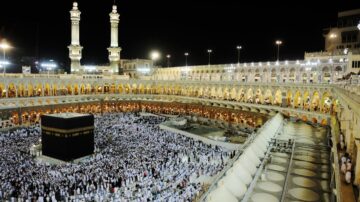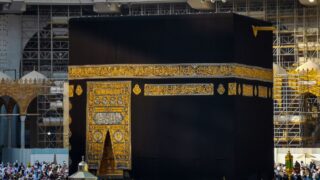After highlighting the significance of Kabah, Surat Aal-Imran moves on to state that God has imposed a duty on mankind to make pilgrimage to this House once they are able to do so. Otherwise, they let themselves fall into disbelief which causes God no harm:
{Pilgrimage to this House is a duty owed to God by all people who are able to undertake it. As for those who disbelieve, God does not stand in need of anything in all the worlds.} (Aal-Imran 3:97) One thing which attracts our attention when we read this verse is the fact that the duty of pilgrimage is made in absolutely general terms: {… a duty owed to God by all people.} This suggests, first of all, that the duty of pilgrimage is also required of the Jews who disputed the validity of the Muslims turning to the Kabah in their Prayer
Their argument fails completely when it is realized that they themselves are required to make the pilgrimage to this House, since it is the House built by their father, Abraham, and the first one ever to be set up for worship by mankind.
In this light, the Jews appear to be the deviant and disobedient ones. We may also infer from the way this verse is phrased that all mankind are required to accept this faith, fulfill its duties, offer its worship, and make the journey of pilgrimage to the House to which the believers in God turn. Unless they do this, their stand is one of disbelief, no matter how strongly they may profess to be believers.
God stands in no need of anything or anyone. He does not need people’s belief in Him, nor does He benefit by their pilgrimage. The benefit and prosperity are theirs when they accept the faith and offer the worship
Pilgrimage is a personal obligation on every individual once in a lifetime, and it becomes due when the conditions of ability are fulfilled, including physical health, ability to travel and safe passage.
There is, however, a difference of opinion among scholars with regard to the time when this duty was imposed. Relying on the report that the present passage was revealed in the ninth year of the Prophet’s settlement in Madinah, which is generally known in history books as “the year of delegations”, some scholars believe that pilgrimage was made an obligatory duty in that same year. They support their argument with the fact that the Prophet himself went on his pilgrimage after that date.
When we discussed the question of changing the direction of the qiblah, in our commentary on the preceding surah, we made the point that the timing of the Prophet’s pilgrimage could not be taken as an argument in support of the view that the pilgrimage was made obligatory at a late stage in the Prophet’s life.
Several considerations might have contributed to that delay. One of these may have been the fact that the idolaters used to do the walking round the Kabah (tawaf) completely in the nude, and they continued to do so after the liberation of Makkah The Prophet did not like to join them in their tawaf. The surah entitled “Repentance”, or “At-Tawbah”, was revealed in the ninth year of the Islamic calendar, and idolaters were banned from tawaf in the Kabah altogether.
The Prophet offered his pilgrimage in the following year. Hence, the duty of offering the pilgrimage may have been legislated earlier, and this verse may have been revealed in the early part of the Prophet’s settlement in Madinah, probably around the time of the Battle of Uhud which took place in the third year of the Islamic calendar
Nonetheless, this statement imposes the obligation of pilgrimage, in the terms of a right which God demands from all people who are able to make the journey.
Pilgrimage is the Muslims’ annual general assembly which is held at the House from which their message was given to them for the first time, and which witnessed the birth of the pure faith of Abraham, their first father, and which was the first House God has set up on earth for His own worship.
Pilgrimage is, therefore, an assembly of great significance. Its historical associations centre round the noble concept of faith, which highlights the link between man and his Creator.
Faith means man’s spiritual response to God, a fact of great significance considering that only by the breathing of God’s spirit has man acquired his humanity. It is a worthy concept to form the basis for human unity. Hence, it is appropriate that people should assemble every year at the Sacred Place which witnessed the birth of this call to mankind to unite on pure faith.
By Sayyid Qutb

















